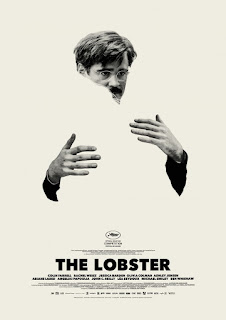Hotels can be notoriously scary places, especially in film. Nobody in their right mind would choose to stay at Overlook Hotel, and a quick shower at the Bates Motel could leave you with holes in more than just your wallet. But few cinematic hotels are as frankly terrifying as The Hotel in The Lobster.
There might not be crazy twins, blood rivers or psychotic
murderers, but you will still lose your mind. Love and relationships are the
subject of Greek director Yorgos Lanthimos’ first English feature, set in a
bleak, washed out dystopia where single people are taken to The Hotel
and forced to find a partner within forty five days. Succeed and the new couple
can move to The City. Fail and they’re turned into an animal of their choosing
and left to roam the countryside alone. It is the most absurd, uniquely bizarre
film you’ll see this year.
What makes The Hotel so frightening is its lack of soul. Run
by stern matriarch Olivia Coleman (in superb form), the hotel guests wander
like helpless children, devoid of personality, as if lobotomised. The strict
regime of the prison-like yet supposedly idyllic retreat is so psychologically damaging, it strips the guests
(literally) and reduces them to a single character trait. Partnerships only
arise when these traits align in a match. Masturbation is disallowed, whilst
the maid arouses the male guests to increase their sexual frustration. An alarm
signals “the hunt” whereby guests are forced to sedate “loners” living in the
countryside. It’s enough to drive guests to fake a partnership just to escape.
Yet the film’s wonderful style swings the opposite way. The
dreary mise en scene, deadpan delivery and overly dramatic orchestral score
combine for hilariously dry viewing. The script is full of knowing lines that
heighten the film’s clear absurdity and black humour, whilst the performances of Farrell, Coleman
and Ben Whishaw (as a fellow guest) are often laugh out loud funny.
This doesn’t last. Halfway through, the film turns. Escaping
The Hotel, David finds himself living with the cult-like loners in the forest led by Léa Seydoux (of Spectre fame) –
a mirror image of The Hotel where singledom is the order of the day. Flirting
results in the “red kiss”, the slicing of lips. We’re left to image what the “red
intercourse” entails. It’s here that David ironically meets his match (and the
film’s narrator) in Rachel Weisz’s Short Sighted Woman, and the couple are
forced to hide their true feelings. It’s also here that Lanthimos runs out of
ideas. The plot meanders, the characters are less amusing, and the film’s
stylistic joke runs thin as it begins to take its central conceit too
seriously. The comical tone is dropped for something darker, more disturbing,
and less engaging.
As a surreal satire of love, relationships and the modern obsession of
finding our match, The Lobster is an
extraordinary film. It explores the extreme lengths that people will go to in
order to find love and asks us to question whether it’s easier to fake love
when trapped in the wrong relationship, or to hide your true feelings for
someone when you’re unable to commit. Love ultimately is a fickle and uncontrollable
force – we are doomed with or without it. Conceptually, The Lobster is a provocative and confrontational look at
fundamental human emotions, but its downbeat second half will likely leave you
feeling cold.
3/5
Watch: The Lobster is
out now.
